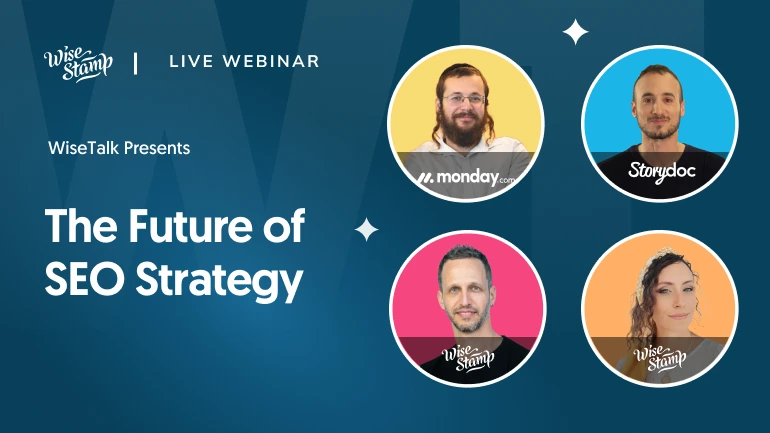Top 5 Takeaways From “WiseTalk: The Future of SEO” Webinar
WiseStamp was joined by the Head of Marketing of Storydoc, and the Senior SEO Expert of Monday.com to discuss The Future of SEO.

On Monday, August 19th, 2024, WiseTalk co hosts Natalie Stenge and Daniel Zweig were joined by two panelists to discuss the current state of SEO, and more importantly, the future of SEO.
Ben Kazinik, Senior SEO Expert from Monday.com, and Amotz Harari, Head of Marketing at Storydoc, shared practical tips on future-proofing an SEO strategy, as well as their thoughts about the field.
The discussion covered:
- Google updates
- Which SEO practices still apply
- SEO and AI
- SEO beyond Google, and
- A live roast of several websites submitted by audience members, with practical SEO tips for each business.
Here are the top five takeaways from this edition of WiseTalk:
1. The best use of AI for writing SEO content
On the topic of using generative AI platforms, the panelists unanimously agreed: AI is simply a tool, and is only effective as the person who wields it. The experts recommend that you use it as creatively as you like for ideation, research, editing. As Kazinik put it: “We have more tools in our tool stack now to create content faster.”
But when it comes to actually writing your content – the panelists recommend not to bother.
Not only does relying on AI lead to lower quality content, it sets off AI detectors both on Google, and even other platforms like Reddit. Harari shared a personal anecdote of investing quite a lot of time in training an AI tool to suit Storydoc’s brand voice: “I got to a point where it wrote beautifully…And then I ran it through an AI detector and it was like: 100% AI.”
He warns, “If they recognize it as AI, it’s probably going to be demoted to the bottom of the list.” And we all know that what Google doesn’t like will affect your rankings.
2. Google algorithms are always changing, and that’s ok
The discussion also touched upon two hot topics in SEO today:
- Google core updates – the most recent one in March was the second to longest in history at 45 days
- The unprecedented leak in May – the 2500 leaked documents describe ranking factors that until now have either been unconfirmed or denied
Harari says, “We can sum up this leak as: I told you so!”
Is it important to keep up with all of these updates and leaks? The panelists claimed that, as long as you’re providing valuable content, not really. Kazinik says, “If you focus on content quality, then you don’t have to know any of the updates…The best practices in SEO are still the same.”
Which brings us to our next takeaway:
3. Content quality is as important as ever
Another matter that both experts adamantly agreed upon was that if you want to win at SEO, you need to continuously focus on creating high-quality, user-centric content. This is particularly powerful now that the internet has been deluged by copy/pasted AI-generated content.
Want to improve your SEO? Become a subject matter expert in your niche, and focus on creating content that covers every step of your funnel, rather than driving traffic. Harari in fact argues that traffic can be a vanity metric – though it is one that most businesses carefully monitor.
A main measure of quality content is the value it provides to your audience. When it comes to Google’s recent Helpful Content Update, Kazinik claims that the sites hit the hardest may have lost focus on this point: “I think people that were using programmatic SEO incorrectly, just creating a bunch of pages at scale. People that weren’t focused on content quality, so they’re creating things that weren’t helpful to the user.”
4. SEO must go beyond Google
There is no doubt that good SEO goes beyond Google SERPs – and in fact, Google feels the same way, as will be covered next.
The panelists described that when an SEO’s guiding light is to become a subject matter expert, this makes room for greater creativity in where and how your audience consumes your content. Indeed, for certain industries, creating and optimizing content on platforms such as Reddit, YouTube, or even AI search platforms Bing or SearchGPT can lead to great results down the line.
One practical tip that Kazanik gave in this realm is to identify content that may not be ranking well on SERPs, but do make for engaging social media content. With the help of AI for ideations, you can repurpose content into podcasts or YouTube videos, for example.
5. Brand authority impacts SEO ranking
One widespread suspicion within the SEO industry was that the size of your website is a key ranking factor. This was in fact confirmed by the Big Leak in May, mentioned above. Kazinik explains “If you’re a big website with established authority, then they basically whitelist you.” So what to do if you’re not in that minority of websites?
In addition to creating quality content and improving user experience of your site, Kazinik encourages SEOs or small business owners to prioritize brand awareness campaigns. In fact, during the live website roast that he led at the end of the discussion, he advised the audience member to show up regularly on LinkedIn.
Conclusion
If these experts could give you just one piece of advice on future-proofing your SEO strategy, they say it’s providing value through your content. This will be the biggest differentiator in the growing noise of AI content, and it is a strategy that is sure to carry you through any more shifts in the industry – Google updates and all – in the future.
WiseTalk is a series of conversations on all things marketing and SaaS. To learn about future WiseTalk episodes, follow the WiseStamp LinkedIn page, or sign up to our monthly newsletter, GetWiser.

